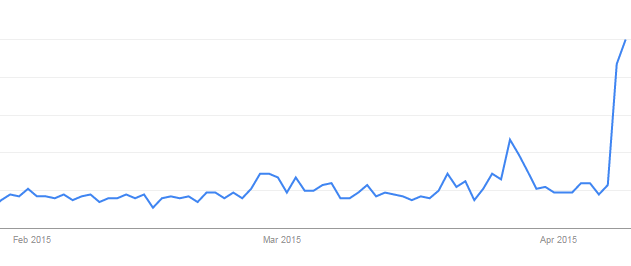Anti-Piracy Threats Trigger Massive Surge in VPN Usage
samedi 11 avril 2015 à 20:49 This week news broke that the makers of Dallas Buyers Club have the court’s approval to go after 4,726 alleged movie pirates in Australia, opening the door to many more copyright lawsuits.
This week news broke that the makers of Dallas Buyers Club have the court’s approval to go after 4,726 alleged movie pirates in Australia, opening the door to many more copyright lawsuits.
Around the same time the country’s largest Internet providers submitted their online anti-piracy code, announcing that 200,000 piracy warnings will be sent out each year.
Facing increased monitoring and potential legal action many file-sharers have taken counter measures, hiding their IP-addresses so their sharing activities can no longer be linked to their ISP account.
Early March, the initial announcement of the warning letters already increased interest in VPNs and other anonymizing services, but this week’s surge broke new records.
Data from Google trends reveals that interest in anonymizing services has soared, with searches for “VPN” quadrupling in recent weeks. This effect, shown in the graph below, is limited to Australia and likely a direct result of the recent anti-piracy threats.

The effects are clearly noticeable at VPN providers as well, in both traffic and sales. TorGuard, a VPN and BitTorrent proxy provider, has seen the number of Australian visitors spike this week, for example.
“Over the past week TorGuard has seen a massive jump in Australian subscribers. Traffic from this region is currently up over 150% and recent trends indicate that the upsurge is here to stay,” TorGuard’s Ben Van der Pelt tells us.
“VPN router sales to Australia have also increased significantly with AU orders now representing 50% of all weekly shipments.”

The recent events are expected to drive tens of thousands of new users to anonymizing services. However, it appears that even before the surge they were already commonly used Down Under.
A survey among 1,008 Australians early March showed that 16% of the respondents already used VPNs or Tor to increase privacy. The Essential survey shows that anonymizing tools are most prevalent among people aged 18-34.
While copyright holders don’t like the increased interest in these evasion tools, it may not all be bad news.
In fact, to a certain degree it shows that pirates are spooked by the new initiatives. Where some decide to go underground, others may choose to pirate less. And for the “trolls” there are still plenty of unsecured file-sharers out there.
Source: TorrentFreak, for the latest info on copyright, file-sharing, torrent sites and anonymous VPN services.
 Every year the RIAA and MPAA submit their overviews of so-called “notorious markets” to the Office of the US Trade Representative (USTR). Sites detailed in these reports are branded “rogue”, a label reserved for the supposed worst-of-the-worst in the piracy landscape.
Every year the RIAA and MPAA submit their overviews of so-called “notorious markets” to the Office of the US Trade Representative (USTR). Sites detailed in these reports are branded “rogue”, a label reserved for the supposed worst-of-the-worst in the piracy landscape.

 While relatively underreported, many U.S. district courts are still swamped with lawsuits against alleged film pirates.
While relatively underreported, many U.S. district courts are still swamped with lawsuits against alleged film pirates.  Last year the movie The Expendables 3
Last year the movie The Expendables 3  “I’d like to thank the Police Intellectual Property Crime Unit (PIPCU) at the City of London Police for working with US Homeland Security Investigations to apprehend the suspect in this case. It is important to protect the rights of creatives around the world from theft,” Stallone said.
“I’d like to thank the Police Intellectual Property Crime Unit (PIPCU) at the City of London Police for working with US Homeland Security Investigations to apprehend the suspect in this case. It is important to protect the rights of creatives around the world from theft,” Stallone said. While video gaming used to be a strictly offline affair, in the current market many titles require continued access to custom online resources in order to function.
While video gaming used to be a strictly offline affair, in the current market many titles require continued access to custom online resources in order to function. While the ESA appears to have at least drawn a distinction between piracy and non copyright-infringing activity in its 2014 submission, the EFF says that the software group is now using language that closes the gap somewhat.
While the ESA appears to have at least drawn a distinction between piracy and non copyright-infringing activity in its 2014 submission, the EFF says that the software group is now using language that closes the gap somewhat.